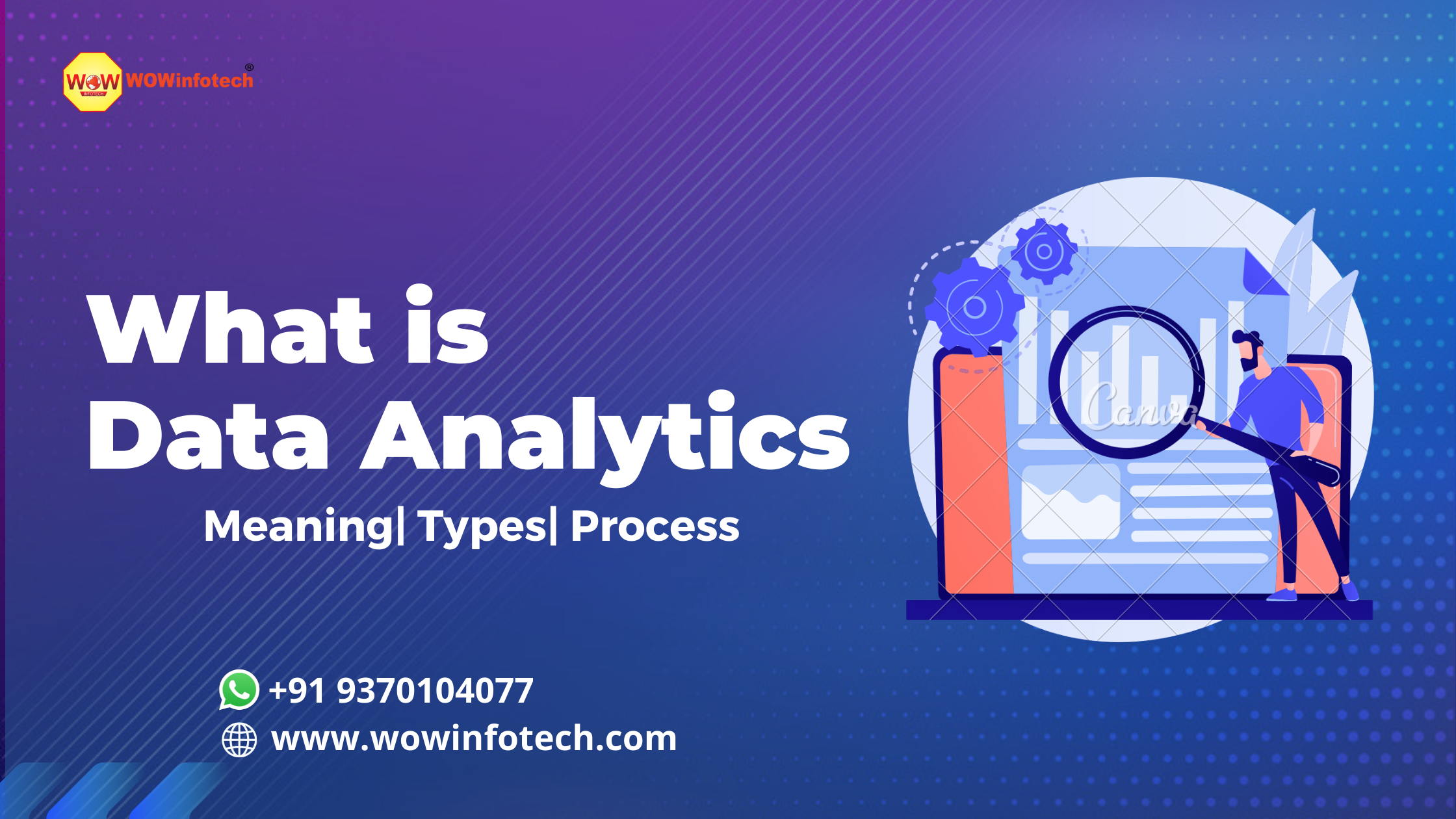Data analytics is one of the most popular terms today. Currently, data is more than oil for industries. The data is collected in raw form and processed as per the company and then this data is used for decision-making purposes. This process helps to grow business workflow and expand their operations in the market.
What is Data Analytics?
Data Analytics is collecting, modeling, and analyzing data to draw insights that support decision-making. There are several methods and techniques for analyzing industry and research objectives. It is a more important process for businesses to collect and proceed with data to make the right business decision. It helps businesses to target the right audience or customers, and also it reduces business costs.
So, in short, if you understand your business administration and have the ability to do exploratory data Analytics to gather the necessary information, you are well on your way to a career in data analytics.
Data Analytics Process
- Business Understanding: Whenever there is a need, first you have to set business objectives, evaluate the situation, set data mining targets and then plan accordingly. At this stage, the business objectives are defined.
- Data Exploration: For further processing, we need to collect the initial data, describe and explore the data and finally verify the data quality that it contains the data we need. Data collected from various sources is described in terms of project requirements and its application at this stage. This is also called data exploration. This is necessary to check the quality of the data collected.
- Data Preparation: From the data collected in the last step, you need to select the data as required, clean it, create it to get useful information and then combine it all. Finally, we need to format the data to get the right data. Data is finally selected, cleaned and aggregated for Analytics at this stage.
- Data Modeling: After collecting the data, do the data modeling on it. For this, it is necessary to select the modeling technique, prepare the test design, create the model and evaluate the model created. The data model is designed to analyze the relationships between different selected objects in the data. Test cases are created to evaluate the model and the model is tested and implemented on this stage data.
- Data Evaluation: Evaluate the results from the last step, review the extent of the error, and determine the next steps. We evaluate the results of trial cases and review the range of errors in this phase.
- Deployment: Plan deployment, monitoring and maintenance and prepare final report and review project. At this stage, we deploy the results of the Analytics. This is also called a project review.
The complete process is known as the Business Analytics process.
Types of Data Analytics
There are four main types of techniques used for Data Analytics:
- Descriptive Analytics: In descriptive Analytics, it works on past data to draw conclusions and present our data as dashboards. In businesses, descriptive analytics is used to determine the Key Performance Indicator or KPI to evaluate the performance of the business.
- Predictive Data Analytics: In predictive data analytics, it determines the future outcome. Based on the Analytics of the historical data, it can forecast the future. It makes use of descriptive analytics to generate predictions about the future. With the help of technological advancements and machine learning, we can get predictive insights about the future. Predictive analytics is a complex field that requires a large amount of data, skilled implementation of predictive models, and tuning to get accurate predictions. This requires a skilled workforce that is well versed in machine learning to develop effective models.
- Diagnostic Analytics: Businesses need to think seriously about the nature of the data and understand the descriptive Analytics in depth. In order to find the problem in the data, we need to find inconsistent patterns that may contribute to the poor performance of our model. In diagnostic Analytics, you can diagnose various problems displayed by your data. Businesses use this technique to minimize their losses and optimize their performance.
- Prescriptive Analysis: Prescriptive analysis combines insights into all of the above analytical techniques. This is referred to as the final frontier of data analysis. Prescriptive analytics allows companies to make decisions based on them. It makes huge use of artificial intelligence to enable companies to make business decisions with caution.
Why is Data Analytics important?
Data analytics plays an important role in improving your business as it is used to gather hidden insights, create reports, analyze the market and improve business needs.
- Check Insights: Hidden insights from data are gathered and then analyzed with respect to business requirements.
- Generate Reports: Reports are generated from the data and are passed on to the respective teams and individuals to deal with further actions for growth in business.
- Perform Market Analysis: Market Analysis can be performed to understand the strengths and weaknesses of competitors.
- Improve Business Requirement: Analysis of Data allows for improving business to customer requirements and experience.
We are a leading mobile app and website development company and we have experience in developing efficient fitness apps for global clients. We will assist you with the best possible strategies and affordable cost estimations for your app requirements. Contact us for more information. We are best Mobile App Development Company and we provide the best mobile app development services , contact us at info@wowinfotech.com or call us at +91 9370104077.
-

Krishna Handge
WOWinfotech
Feb 17,2023
